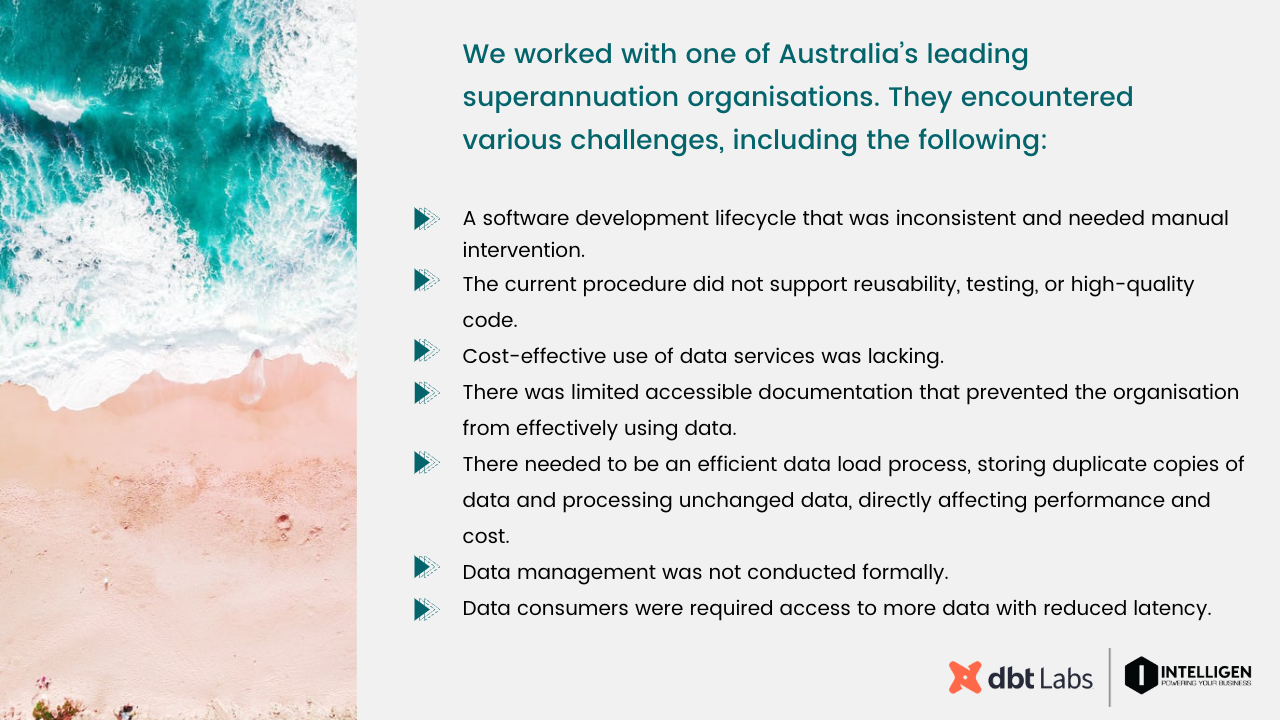In this week's newsletter, you'll discover how dbt's cost-effective data management solutions empower financial organisations to enhance their decision-making and manage risk more efficiently.
As financial organisations face increasing pressure to manage risk, drive profitability, and comply with regulations, the need for reliable and accurate data has never been more critical. However, managing and transforming data in complex data warehouses can be daunting, requiring significant time, resources, and expertise. This is where dbt (Data Build Tool) comes in.
dbt is an open-source tool for transforming and analysing data in data warehouses, which has gained popularity for its ability to streamline data operations and improve the accuracy and consistency of data. dbt allows users to define data transformation pipelines using SQL and provides features like testing, documentation generation, and version control integration to help ensure the reliability of the data.
dbt Labs, the company behind dbt, offers a range of services to help financial organisations get the most out of the tool. For example, dbt Labs provides commercial support, consulting, and training to help data teams use dbt effectively. They also offer a cloud-based platform called dbt Cloud, which provides a managed environment for running dbt projects and features like collaboration, scheduling, and alerting.
Let’s dive in a little to learn how dbt can help financial organisations transform and analyse their data.

With the implementation of dbt, this organisation is now able to manage data between assets so that data engineers can keep it updated and won’t have to manually configure them, making the process more efficient while reducing risk. dbt allowed documentation to be automatically generated, including business definitions and lineage of data flows to be shared with data consumers promoting consistent use of data across the organisation. It also helped organise and manage the organisation’s data assets efficiently and effectively. In addition, dbt can automate the building and updating of databases to help eliminate errors and inconsistencies in data. Ultimately, the implementation of the usage of dbt helped the organisation run a more effective and efficient way of managing data while saving on labour and other costs.
In further detail, dbt can help in the following areas in the financial sector:
Financial performance reporting: Financial organisations can use dbt to build pipelines that transform financial data (such as revenue, expenses, and profitability) into meaningful reports that can be used to track performance and make strategic decisions. With dbt, data teams can quickly build and maintain these pipelines, ensuring accurate and up-to-date reports.
Risk management: Managing risk is a critical function for financial organisations, and dbt can help by transforming risk-related data (such as credit ratings, market volatility, and regulatory compliance) into insights that can inform risk management strategies. With dbt, data teams can easily transform and analyse this data, allowing them to identify and mitigate risk more effectively.
Compliance reporting: Financial organisations are subject to various regulations, and dbt can help by transforming data into compliance reports that meet regulatory requirements. For example, dbt could transform transaction data into a report that meets anti-money laundering (AML) requirements. By automating this process, financial organisations can ensure they meet regulatory requirements while freeing up resources for other critical functions.
Overall, dbt offers financial organisations a powerful tool for managing and transforming data in complex data warehouses. By providing a streamlined and reliable approach to data operations, dbt can help financial organisations drive better decision-making, manage risk more effectively, and comply with regulations. Want to know more about how dbt can manage your data? Click here, and let’s have a chat. We can’t wait to hear from you!
These Posts are Suggested For You





